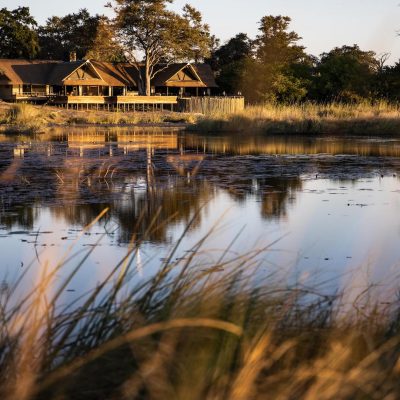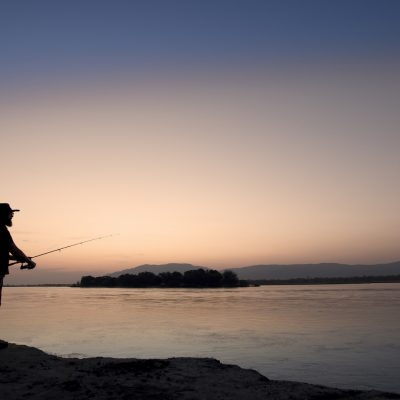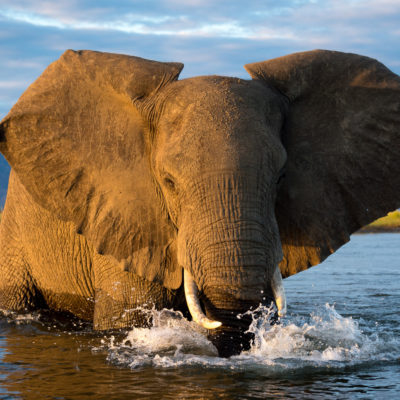Bumi Hills Safari Lodge rests within a private concession adjacent to the Northeast border of Matusadona National Park, and overlooking the vast waters of Lake Kariba. The lodge offers stunning views of the tranquil sapphire horizon, which guests can enjoy from the outdoor infinity pool (which seems to blend into the lake itself), or from the multi-level dining terraces. Bumi Hills Safari Lodge consists of 10 rooms with views over the lake, as well as the Baobab Villa, each with balcony views over the lake and beautifully finished in a fusion of contemporary western and African styles. Guests can enjoy an authentic safari experience in stunning and luxurious surroundings and explore both the land and water with game drives and sunset cruises.
Bumi Hills Safari Lodge, Kariba, Zimbabwe
Bumi Hills Safari Lodge is located just outside of Matusadona National Park’s Northeast border, on the shores of Lake Kariba. This allows guests to admire the picturesque lake views from the comfort of the lodge, and lounge beside the tranquil waters in the infinity pool. Guests can reach Bumi Hills Safari Lodge by flying from Victoria Falls International Airport (1 hour and 40 minutes), Harare International Airport (1 hour and 30 minutes), Mana Pools (30 minutes), or Hwange (1 hour and 30 minutes). All flights land at the Bumi Hills Airstrip where guests can take a five-minute transfer to the camp itself.
- Situated beside Matusadona National Park
- Rich game viewing opportunities
- Abundant birdlife
- Restaurant and bar
- Lakeside swimming pool
- Spa treatments available
- Entertainment room
- Gym facilities
- Complimentary wi-fi
- Family-friendly
Created by the flooding caused by the Kariba Dam, Lake Kariba is the fourth largest manmade lake in the world – its shoreline spanning 2,000 km. The surrounding area is rich with wildlife, bordering the Matusadona National Park where guests can expect to see the infamous Big Five. Matusadona is also home to a large antelope population that lures in predators, and it once supported one of the densest populations of lions in Africa, which has unfortunately suffered due to illegal poaching.
The rolling hills and endless floodplains create a serene and beautiful landscape that can be enjoyed on game drives and boat trips across the lake. Kariba’s shoreline merges with a kilometre-wide drowned forest which is ideal for the 240 species of birdlife that have made this region their home. The waters are also teeming with fish, allowing for amazing fishing excursions.
The rainy season in Zimbabwe begins in November, when the weather begins to become less predictable and rainy afternoons becoming increasingly likely. December to March are the wettest months of the year, the afternoons characterised by high temperatures and humidity. In April, summer comes to an end and the days begin to get cooler. Rain becomes less common as the year transitions into May and the dry season lasts until late October. Mornings and evenings throughout the dry season can be quite cold and guests may want to bring jumpers and warm clothes for early morning game drives.
The Lake View Rooms at Bumi Hills Safari Lodge are generously spaced apart near the waterfront allowing stunning panoramic views from your private verandah. The rooms are positioned along the hillside, offering an elevated perspective of the idyllic scenery. Each of the 10 rooms are open plan, with a low wall to give the en-suite more privacy. The bathroom consists of a toilet in its own cubicle, a basin, both bath and shower, and an additional shower outside with curtains for privacy. The bedrooms are furnished with either king-size or twin beds, with a lounge area consisting of a safe and writing desk. The large sliding doors open out to your verandah, providing a flow of air, and the room also features air-conditioning.
Baobab Villa is a 2 bedroom home away from home, suitable for a maximum of 5 guests. The villa is ideal for families or couples travelling together, offering guests a private stay with its own private bar and living room. The villa also comes with a private butler as well as your own safari guide and vehicle. There are both indoor and outdoor dining areas where guests can gather and connect, swapping stories about their safari experiences and using this time to grow closer.
Guests staying at Bumi Hills Safari Lodge can look forward to 3 delicious meals each day. Start your day with a selection of treats from the breakfast buffet, including muffins, bread, cereals, fruit, yoghurt and juice. Guests can also choose to order hot food from the kitchen. Enjoy a light lunch one returning from your first activity of the day, before tucking into a three-course dinner in the evening which concludes with a sweet dessert and beverage. Meals are usually enjoyed communally, giving guests the chance to interact and connect with one another, however, private dining options beside the lake are also available. The chefs will cater for any dietary requirements if given advanced notice.
Venture out on an exciting game drive and explore Bumi Hill’s private concession from the comfort of a specialised safari vehicle. The camp’s knowledgeable guides will be able to teach you interesting facts about the incredible animals of Zimbabwe, as well as showing you the best spots for viewing game. Look out for elephants, zebras, waterbuck, buffalo, lions, impala and hippos, as you traverse the plains and roam the African wilderness. Lake Kariba is home to an abundance of Nile crocodiles, and the shores offer spectacular views of the giant herds of elephants and the Big Five. Night drives are also available, allowing guests to see the smaller nocturnal species that often remain hidden during the daytime drives.
The Bumi Hills Wildlife Area joins on to the local Chalala and Mola communities, which are home to Tonga people, a community of spiritual people who have lived along the length of the Zambezi River for centuries. Guests can take a trip to the village of Chalala where ancient traditions are meeting modern ways of living such as the use of electricity. However, a permanent supply of energy and water is not yet set up, meaning that the local people are dependant on the natural environment for many things. The villages are reliant on fishing and raising livestock in order to provide for themselves. Meet the local people who know the area best and learn about ancient Tonga customs and heritage.
There are over 240 species of birdlife around Lake Kariba, including the squacco heron and collared pratincole. Guests who are particularly interested in bird watching will particularly love Zimbabwe’s rainy season when the migratory birds return. By the lakeshore, guests will be able to spot aquatic bird species as they fish in the waters, such as the abundant fish eagles. Watch these incredible creatures as they swoop through the air, effortlessly plucking their prey from the lake, and listen to their beautiful songs.
Set off on a boating adventure and cast your line in the waters of Lake Kariba. Guests can explore the waters and reel in a range of fish including tiger bream, tilapia and vundu catfish. Fishing is done on a catch-and-release basis to protect aquatic populations. Enjoy this peaceful activity while admiring the stunning lake views and rolling Bumi hills.
Drift along the cyan waters of Lake Kariba with a beverage in your hand, and watch the silhouettes of elephants wander across the horizon as the sun dips behind the rolling hills, casting a burnt orange glow across the lake and sky. Enjoy watching the landscape transform before the glimmering stars begin to emerge, and Zimbabwe’s nocturnal creatures begin to stir.
Explore the bush on foot on a walking safari, and experience the smaller details that make safaris more immersive. Your experienced guide will be able to teach you how to recognise tracks, and follow clues left in the wilderness that will lead to incredible game viewing opportunities. Explore at your own pace, without the noise of an engine to startle the wildlife, and take advantage of incredible photographic opportunities. Game walks often last from 1 to 2 hours, and children aged 15 years and under can experience nature walks around the camp led by child-certified walking guides.
Spend a relaxing evening cuddled up beside a roaring campfire and gazing up at the stars above. The guides at Bumi Hills Safari Lodge will be able to show you a variety of constellations visible from the southern hemisphere, including those that make up the Milky Way. Enjoy the stars away from light pollution that makes them so much harder to see back home, and admire the amazing lights and colours from millions of miles away.
The Ngwana Club offers a range of fun activities for young travellers such as nature walks around camps with trained and child-certified guides, learning cultural arts, crafts cooking lessons and storytelling. The club gives children the chance to take part in fun and educational activities so that parents can enjoy the lodge’s spa or take a guided walk into the wilderness.
The African Bush Camps Foundation has established a number of projects that aim to improve education, empowerment and conservation efforts within the local communities where they operate. They work with members of the community in order to improve school facilities, provide educational textbooks and supplies for students, and supporting a local health centre, as well as encouraging these communities to form a peaceful relationship with the local wildlife, and finding ways to resolve human and animal conflict. African Bush Camps contribute $10 USD towards the Foundation’s running costs for every night that a single guest stays at one of their camps.
The Detema Sewing Group was launched to empower women with limited employment opportunities by allowing them to practice creating garments and provide sewn products to local schools, businesses, and community members. The 8 women from Detema are all aged over 50 years, making it difficult for them to find employment due to being close to retirement age. This initiative supports them while allowing them to develop their sewing skills. The ladies then pass their skills on to local children who attend classes to develop this useful life skill.
African Bush Camps work with local communities in the areas where they operate in order to teach and encourage ways of living harmoniously with wildlife. When wildlife habitats become too close to human villages, predators such as lions and wild dogs can attack livestock, and elephants may trample crops. This can cause humans to retaliate in order to protect their livelihoods. By providing the tools and skills to protect livestock and crops, African Bush Camps are helping to reduce human and wildlife conflict.
‘By coexisting with wildlife and using the natural world to grow crop yields, protect livestock and use resources to preserve the environment, communities can improve their food security and achieve a higher quality of life without negatively impacting wildlife. With projects that aim to improve the perception and tolerance of wildlife in the area, we can help communities restore a harmonious relationship with nature for their benefit.’
Tourism helps to support the local communities, and by showing the benefits of sustainable travel, African Bush Camps can highlight why protecting and conserving wildlife habitats is crucial for human communities and the local economy.
African Bush Camps support both orphaned and vulnerable children through their scholarship programmes. The scholarships pay for school fees and allow children to attend Life Skills Workshops where they can gain skills that will boost their employability prospects. African Bush Camps also work with schools to improve their facilities in order to better support the students. By providing a safe, clean, engaging and social environment, students are able to work better and their physical and mental wellbeing is cared for. Providing children with a safe space to learn is crucial for overcoming poverty and offering children the chance to have a higher quality of living and a career.
The African Bush Foundation runs a ‘Greener Camps’ programme which means that ‘African Bush Camps Safari Properties are committed to operating in a sustainable manner, ensuring that we preserve the environment, culture and conservation of Africa. Where possible we use solar power, low energy lighting systems, wastewater treatment, greywater recycling, and single-use plastic reduction initiatives.’ This means that the impact on the environment caused by African Bush Camps is kept to a minimum.
The biggest threat to African lions is conflict with humans. Livestock is vital for many people’s livelihoods, and if lions attempt to attack livestock, it can have devastating effects for both the owners, and the lions themselves if people were to retaliate. Because of this, the Lion Guardian teams are trained to empower and educate local communities about living in harmony with wildlife. By providing an income for the local members of the community that become Lion Guardians, the African Bush Camps Foundation is able to support the guardians and their families as well as protect lions and livestock.
The Mambanje Community Garden and Solar Borehole project aims to provide clean and safe water sources for the local community and their livestock so that the community can be self-reliant, and not have to use the local school’s borehole which is struggling with the current demand for water. Creating a community garden will also provide a source of healthy food and income for the community.
‘The water shortage is critical in Mambanje village with only 1 working borehole servicing both the school and greater community. Currently, households are limited to 20 litres of water per day at the school while school children can take back home only 5 litres per day. The school is now limited to the amount of water it can use which has affected the output of the school’s nutrition garden. The community lies in Zimbabwe’s Farming Region IV which is characterized by annual rainfall of 450-650 mm, severe dry spells during the rainy season, and frequent drought and this limited rainfall speaks volumes as to why areas such as Mambanje are still underdeveloped as water is a key and fundamental resource for rural communities and their livelihoods.’
Providing additional waterholes would also benefit members of the community who have to travel a long distance in order to collect water. This is often a task given to young girls, who may miss out on time in school because they had to collect water for their families instead.
Children of all ages are welcome at Bumi Hills Safari Lodge



